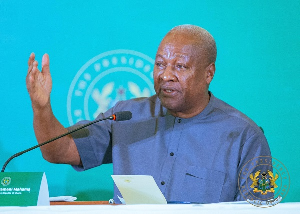Mr. Kweku Agyemang Manu, former Deputy Minister of Finance and Economic Planning on Tuesday testified at the ongoing trial of Mr. Alfred Agbesi Woyome, the businessman involved in the GH¢51.2 million judgment debt case.
Mr. Agyemang Manu who was led in evidence by Mr. Matthew Amponsah, Chief State Attorney said the accused came to his office sometime in April 2005 with a request and as public officer he had to assist him.
Mr. Agyemang Manu said the accused told him he had seen a public advertisement in the media requesting people to submit their bid for the construction of four stadia for CAN 2008 which are turn-key projects.
He said the accused expressed interest in the project and requested that if the government could assist his company Vammed Engineering Limited with an introductory letter he could raise funds at concessionary rates from his bankers outside to undertake the project.
He said before he gave the accused the introductory letter to be sent to his bankers outside he had to consult his boss, Mr. Yaw Osafo Marfo, former Minister of Finance and Economic Planning, about the issue.
Mr. Agyemang Manu at that juncture tendered a copy of the introductory letter as evidence through the state Attorney to the court.
Mr. Agyemang Manu also denied claims by lawyers of Woyome that the government received a term sheet from the accused spelling out the various components of the loan, adding that no money came to Ghana in respect of that introductory letter.
He further intimated that the government did not send the accused to negotiate any loan on its behalf since the introductory letter was clear on the disclaimer.
When asked by Mr. Sarfo Buabeng, Counsel for Woyome, whether he was part of the committee that evaluated the bids for the stadia project, Mr. Agyemang Manu replied that he was not part of that committee that evaluated the various bids and that whatever happened to it, he was not in position to speak on that issue.
Even though Mr. Agyemang Manu admitted that the introductory letter came with attachments spelling out the various projects he could not produce it himself unless he contacted the Ministry of Finance and Economic Planning.
Mr. Woyome is standing trial for defrauding by false pretences and causing financial loss to the State.
He pleaded not guilty to the charges and was granted a GH¢20 million bail with three sureties to be justified.
Sometime in January 2005, the government invited bids for the rehabilitation of the Ohene Djan and Baba Yara Sports stadia and the construction of two stadia at Sekondi-Takoradi and Tamale.
At the end of the bidding process, some companies were short-listed and invited to submit proposals for the projects and among them were M-Powapak Gmb/VAMED Gmbh and Company.
At the end of the evaluation process, the Finance and Evaluation Committee declared the financial proposals of M-powapak /Vamed Engineering as the most responsive and recommended them to the Central Tender Review Board.
However, before the Board could receive final approval, the Government terminated the process.
Meanwhile, in course of the tendering process, Vamed Engineering assigned its rights and responsibilities to Waterville Holding (BVI) Ltd.
After the termination of the tendering process, Waterville protested and entered into a Memorandum of Understanding (MoU) with the government to commence rehabilitation works on the Accra and El-Wak stadia.
The MoU signed on November 30, 2005, required Waterville to engineer funding for the project on behalf of the government from the Bank of Austria Creditanstalt, guaranteed by the World Bank’s Multilateral Investment Guarantee Agency.
The company arranged bridge financing and subsequent to the MoU, Waterville was authorized by the Ministry of Youth and Sports to move to the site and start work pending the signing of a formal contract.
On December 19, 2005, Waterville engaged M-powapak, led by Woyome, to provide it with financial engineering services in respect of the projects.
A formal contract for the rehabilitation of Ohene Djan and El-Wak stadia was entered into by the Government and Waterville Holding Limited on April 26, 2006.
However, before the contract could become effective, the Government terminated same due to Waterville’s inability to engineer funding for the project as contained in the MoU, which formed a condition precedent to the contract.
Waterville, who initially protested the termination, eventually accepted the move and proceeded to claim monies for the initial works done under the MoU.
The Government paid a substantial amount of Waterville's claims out of which the company fully paid M-powapak, represented by the accused, for the financial engineering services rendered under the contract.
Payment to the accused for his services was duly acknowledged by him in a termination agreement dated 25th November 2006, which brought the relationship between them to an end.
Sometime in August 2009, however, the accused having received all monies due him under the financial engineering services, rendered to Waterville, took advantage of the change in Government and falsely represented to government officials that the Government owed him money for financial engineering services rendered to it under the contract with Waterville.
In his claim to government officials, the accused, who had no contract with government, claimed that as part of the financial engineering services rendered, he managed to arrange €1,106,470,587 for the Government through the Bank Austria Creditans out of which he claimed was entitled to two per cent as financial engineering fees.
Investigations, however, revealed that there were no such funds made available for the benefit of the country by Bank Austria as claimed by the accused.
Further investigations revealed that the accused had no contract with the Government to provide any services.
The only arrangement on financial engineering services the accused had was with Waterville Holdings Limited, and services had been fully paid for and acknowledged by the accused in a termination agreement.
General News of Tuesday, 30 October 2012
Source: GNA












